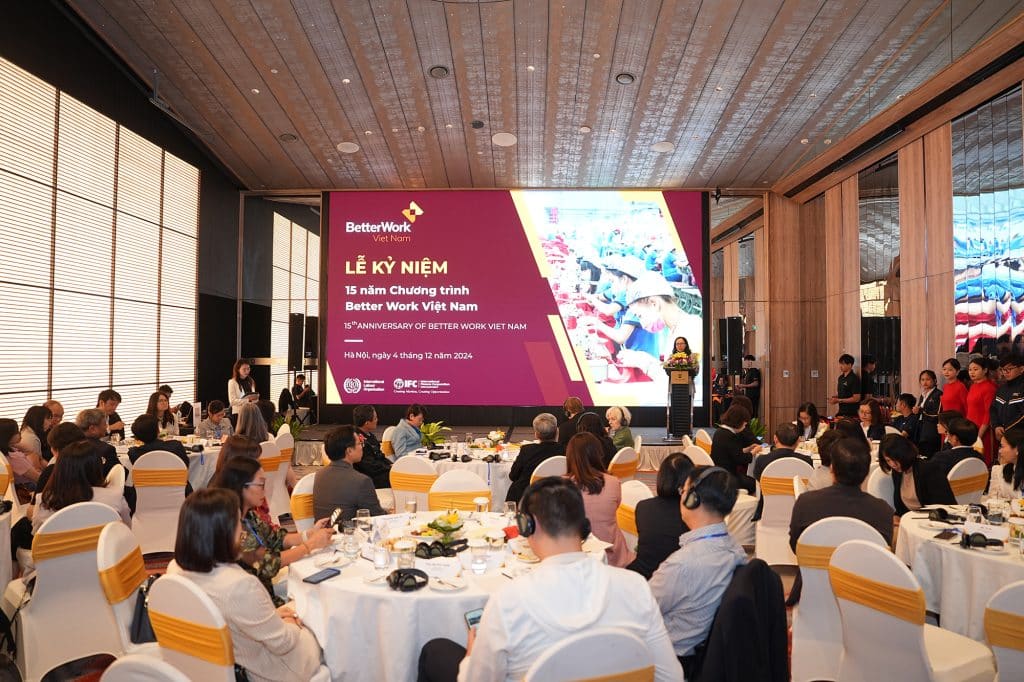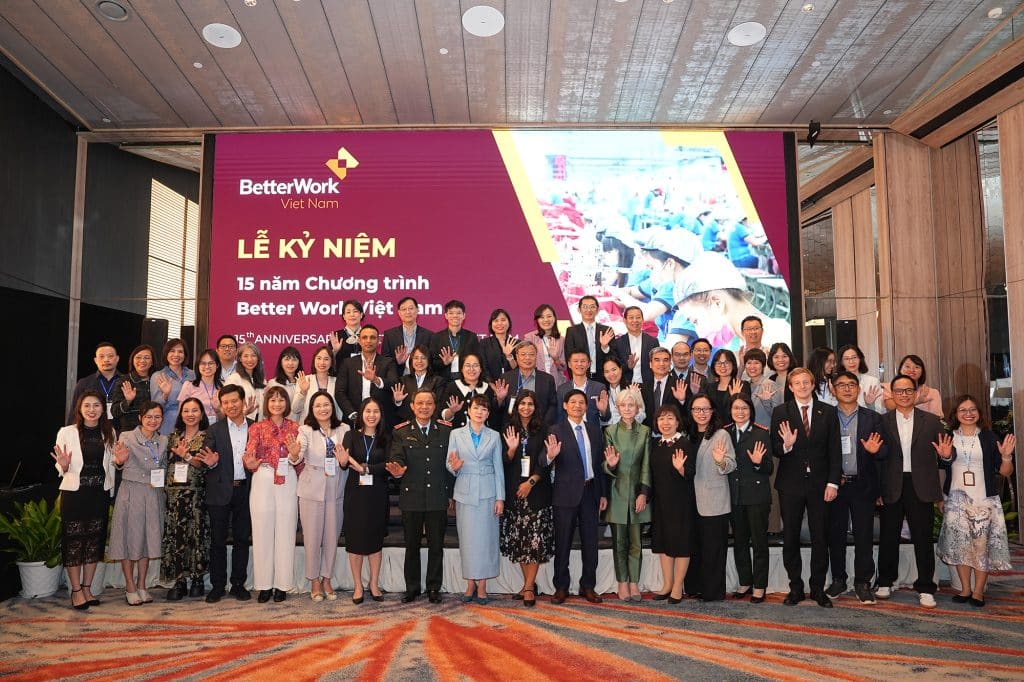Better Work marked 15 years of operations and impact in Viet Nam with a ceremony held in Hanoi on 4 December 2024. The event was attended by nearly 60 delegates, including senior leaders from the programme’s tripartite partner organizations – the Ministry of Labour, Invalids, and Social Affairs (MoLISA), the Vietnam Chamber of Commerce and Industry (VCCI), the Vietnam General Confederation of Labour (VGCL), representatives from the International Labour Organization (ILO), the International Finance Corporation (IFC), development partners, international brands, and representatives from key enterprises participating in the programme.
Starting with just four factories in 2009, Better Work Viet Nam now operates in over 500 garment, textile, and footwear factories across 29 provinces. By 2024, nearly 800,000 workers and their families had benefited from the programme’s activities. Over 60 international buyers have registered to participate in the programme.

Better Work Viet Nam’s assessment reports over the years show that factories have improved compliance with core ILO labour standards and Vietnamese labour laws, particularly in wages, labour contracts, occupational safety and health, and working hours, among others. These advancements have not only improved working conditions but also enhanced factory productivity and profitability.
A survey of 100 participating enterprises conducted in 2024 highlighted that 91 per cent of businesses considered Better Work Viet Nam’s advisory activities as good or excellent in improving compliance and management systems. Meanwhile, 93 per cent of grassroots trade union representatives recognised the programme’s training activities as instrumental in improving soft skills and fostering workplace cooperation. The survey also highlighted that, on average, each enterprise collaborated with seven brands, with approximately four brands utilising shared Better Work reports, streamlining processes and saving resources.
Deputy Minister of Labour, Invalids, and Social Affairs, Mr. Le Van Thanh, stated, “The collaboration among tripartite partners has contributed significantly to the effectiveness of the Better Work Viet Nam programme. The Ministry of Labour, Invalids, and Social Affairs highly appreciates the programme’s contributions. The results achieved demonstrate the effectiveness and importance of the programme in promoting and improving working conditions and labour standards for garment, textile and footwear enterprises in Viet Nam, thereby enhancing the business efficiency and competitiveness of Vietnamese enterprises in the global supply chain.”
“Over the past 15 years, we have seen remarkable progress through Better Work Viet Nam. At the heart of this programme is the spirit of tripartite collaboration and social dialogue – a partnership between MoLISA, VGCL and VCCI. This collaboration has been key to the success of the programme and is critical in achieving the sustainable development goals that we all share,” said Ingrid Christensen, Country Director of ILO in Viet Nam, “The success of Better Work Viet Nam demonstrates that improving labour conditions is not only a moral imperative, but also a sound business strategy. The programme has shown that respecting labour rights and ensuring fair working conditions is integral to building an inclusive, sustainable and competitive economy.”

The event also provided a platform for participants to reflect on their experiences with Better Work Viet Nam and discuss future directions for the programme. On this occasion, Better Work leadership also expressed their gratitude to tripartite partners, development partners, international brands, and business representatives for their trust, collaboration, and support throughout the programme’s 15-year journey in Viet Nam.
Ms. Roopa Nair, Chief of the Better Work Program, stated,“Together, through the collaborative efforts of our national tripartite partners, we have made significant strides in improving working conditions, enhancing workplace collaboration and promoting fair labour practices. As we look to the future, we know that sustaining and expanding the positive impact of Better Work Viet Nam will require new levels of collaboration and investment. We look forward to continuing this journey with our partners, and to working together to build a brighter future for the workers, businesses, and communities that make up the backbone of this vital industry and of Viet Nam’s economic and social development.”
Looking ahead, in addition to direct support to factories and workers, Better Work Viet Nam will focus on key priority areas, including social dialogue, gender equality and inclusivity, occupational safety and health, and data sharing. The programme will also work to strengthen collaboration with partners to further promote the sustainable development of the garment and footwear industries and expand the programme’s impact to other sectors and fields.
